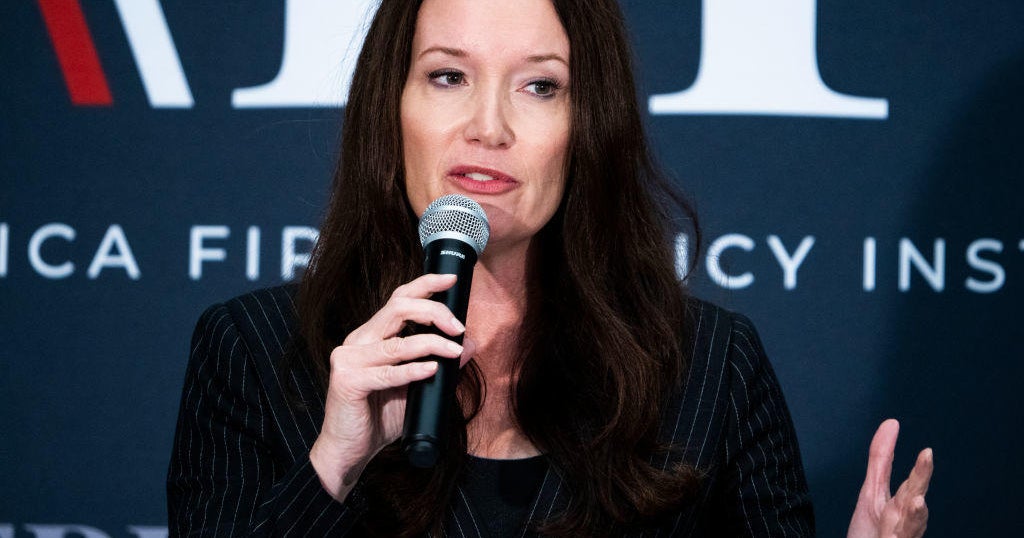CBS News
14 states are cutting individual income taxes in 2024. Here are where taxpayers are getting a break.

Taxpayers in 14 states could get some financial relief this year thanks to lower individual tax rates enacted in 2024, according to an analysis from the Tax Foundation, a think tank that focuses on taxes.
The reductions represent a continuation of “tax cut fever,” as termed by the left-leaning Institute on Taxation and Economic Policy (ITEP). The drive to cut state taxes began during the pandemic when many states found themselves flush with tax revenue. With coffers fat, lawmakers sought to provide some relief to their constituents, typically through tax rebates or rate reductions.
The states that are reducing taxes in 2024 tend to be controlled by Republican lawmakers, although there are some Democratic-controlled states that are also jumping on the tax cut bandwagon. Connecticut, for one, is reducing its tax rates for low- and middle-income residents, while keeping its highest marginal rate unchanged.
Lowering tax rates can help make a state more competitive, potentially drawing remote workers and businesses within their borders, noted Manish Bhatt, senior policy analyst with the Center for State Tax Policy at the Tax Foundation.
“The last few years have been incredibly fast-paced in the world of tax rate cuts, and they are to find a competitive edge over either neighboring states or around the country,” Bhatt told CBS MoneyWatch.
That logic begs the question of whether people and businesses are incentivized to move in pursuit of lower tax rates. The evidence is mixed: While some researchers have found that Americans shifted to low-tax states in recent years, it could be that some of those taxpayers moved because they were in search of a new job, better weather or lower housing costs.
Other research has found little evidence that lower tax rates drive migration. For instance, even if people move to lower-tax states, they are often replaced in their higher-tax states by new people moving in, noted the Center on Budget and Policy Priorities in a 2023 research paper.
Red state tax cuts
Many of the tax cuts will benefit the states’ richest residents, with 12 of the 14 states reducing their top marginal rate, or the tax rate that impacts their highest earners.
Take Arkansas, which is reducing its top marginal rate to 4.4% in 2024, from 4.7% last year. To be sure, the top marginal rate applies to any taxpayer earning more than $24,300, or about 1.1 million residents — a broad base of low-, middle- and high-income earners, according to the Arkansas Advocate.
But about 70% of the tax cut’s benefit will be enjoyed by the 20% richest households in the state, or those earning more than $264,000 annually, the newspaper noted, citing data from ITEP.
In the eyes of Arkansas Governor Sarah Huckabee Sanders, the cut will help draw people to the state. If you are “a young family looking for a new place to settle down, moving to Arkansas has never been better,” Sanders said when signing the bill to lower tax rates last year, the Arkansas Advocate reported.
There are also longer-term issues that could tarnish the allure of tax cuts. For instance, these tax-cutting states could face a financial pinch when a recession hits — which could lead to hits to essential services, from education to road maintenance.
One such example of a tax cut that backfired occurred in Kansas over a decade ago. In 2012, state lawmakers cut income tax rates for top earners by almost one-third and reduced some business taxes to zero. The idea was that lower taxes would kickstart economic growth.
Instead, the state was forced to slash spending on services, including education, and the state actually underperformed neighboring states economically. Eventually, the tax cuts were reversed.
CBS News
Compromise deal reached at COP29 climate talks for $300 billion a year to poor nations

Countries agreed on a deal to inject at least $300 billion annually in humanity’s fight against climate change, aimed at helping poor nations cope with the ravages of global warming at tense United Nations climate talks in the city where industry first tapped oil.
The $300 billion will go to developing countries who need the cash to wean themselves off the coal, oil and gas that causes the globe to overheat, adapt to future warming and pay for the damage caused by climate change’s extreme weather. It’s not near the full amount of $1.3 trillion that developing countries were asking for, but it’s three times the $100 billion a year deal from 2009 that is expiring. Delegations said this deal is headed in the right direction, with hopes that more money flows in the future.
“Everybody is committed to having an agreement,” Fiji delegation chief Biman Prasad said as the deal was being finalized. “They are not necessarily happy about everything, but the bottom line is everybody wants a good agreement.”
It’s also a critical step toward helping countries on the receiving end create more ambitious targets to limit or cut emissions of heat-trapping gases that are due early next year. It’s part of the plan to keep cutting pollution with new targets every five years, which the world agreed to at the U.N. talks in Paris in 2015.
The Paris agreement set the system of regular ratcheting up climate fighting ambition as away to keep warming under 1.5 degrees Celsius above pre-industrial levels. The world is already at 1.3 degrees Celsius and carbon emissions keep rising.
Countries also anticipate that this deal will send signals that help drive funding from other sources, like multilateral development banks and private sources. That was always part of the discussion at these talks — rich countries didn’t think it was realistic to only rely on public funding sources — but poor countries worried that if the money came in loans instead of grants, it would send them sliding further backward into debt that they already struggle with.
“The $300 billion goal is not enough, but is an important down payment toward a safer, more equitable future,” said World Resources Institute President Ani Dasgupta. “This deal gets us off the starting block. Now the race is on to raise much more climate finance from a range of public and private sources, putting the whole financial system to work behind developing countries’ transitions.”
It’s more than the $250 billion that was on the table in the first draft of the text, which outraged many countries and led to a period of frustration and stalling over the final hours of the summit. After an initial proposal of $250 billion a year was soundly rejected, the Azerbaijan presidency brewed up a new rough draft of $300 billion, that was never formally presented, but also dismissed roundly by African nations and small island states, according to messages relayed from inside.
The several different texts adopted early Sunday morning included a vague but not specific reference to last year’s Global Stocktake approved in Dubai. Last year there was a battle about first-of-its-kind language on getting rid of the oil, coal and natural gas, but instead it called for a transition away from fossil fuels. The latest talks only referred to the Dubai deal, but did not explicitly repeat the call for a transition away from fossil fuels.
Countries also agreed on the adoption of Article 6, creating markets to trade carbon pollution rights, an idea that was set up as part of the 2015 Paris Agreement to help nations work together to reduce climate-causing pollution. Part of that was a system of carbon credits, allowing nations to put planet-warming gasses in the air if they offset emissions elsewhere. Supporters said a U.N.-backed market could generate up to an additional $250 billion a year in climate financial aid.
Despite its approval, carbon markets remain a contentious plan because many experts say the new rules adopted don’t prevent misuse, don’t work and give big polluters an excuse to continue spewing emissions.
“What they’ve done essentially is undermine the mandate to try to reach 1.5,” said Tamara Gilbertson, climate justice program coordinator with the Indigenous Environmental Network. Greenpeace’s An Lambrechts, called it a “climate scam” with many loopholes.
With this deal wrapped up as crews dismantle the temporary venue, many have eyes on next year’s climate talks in Belem, Brazil.
CBS News
GOP senator blocks promotion of general involved in Afghanistan withdrawal, sources say

The promotion of a three-star general who was part of the 2021 U.S. withdrawal from Afghanistan has been paused by Republican Sen. Markwayne Mullin of Oklahoma, three sources familiar with the move confirmed to CBS News Saturday.
Lt. Gen. Christopher Donahue was slated to be promoted to a four-star rank and take command of the U.S. Army in Europe. However, he was not included in a batch of nearly 1,000 promotions that moved through the Senate Armed Services Committee this week despite receiving a Pentagon recommendation.
Mullin has put a hold on the promotion. The intention is to allow for the new Republican-controlled Congress and President-elect Donald Trump to weigh in on the promotion given Donahue’s involvement in the Afghanistan withdrawal, two sources familiar with the situation told CBS News.
Behind the scenes, there is an effort underway by the Army and other allies to convince Congress to move forward and lift the hold, which appears to be politically motivated, sources said.
ALLISON JOYCE/AFP via Getty Images
During the campaign, Trump frequently mentioned his surprise that no officers were consequently fired by President Biden for the chaotic withdrawal.
Military officers execute U.S. policy but do not create it. It was the Trump administration that in February 2020 brokered the deal with the Taliban to withdraw U.S. forces from Afghanistan, but it was Mr. Biden who decided to execute that withdrawal despite the Taliban breaking the terms of that U.S. agreement.
Donahue was the last U.S. soldier to exit Afghanistan in 2021. The U.S. evacuated about 125,000 people, including 6,000 Americans, over the course of its withdrawal, during which dozens of Afghans and 13 U.S. service members were killed in a suicide bombing outside Hamid Karzai airport in Kabul.
The U.S. underestimated the speed with which the Taliban would capture Kabul and the well-documented U.S. logistical and planning failures have been a focus of multiple internal probes at the Pentagon, State Department, and in Congress.
An extensive State Department report released last year found that “insufficient” planning, communication failures and an inability to grasp “the scale and scope of the operation” contributed to the chaotic operation.
CBS News has reached out to Mullin’s office but did not receive a response. It is not clear whether Trump is aware of the hold.
contributed to this report.
CBS News
Trump picks former White House aide Brooke Rollins to lead the USDA

President-elect Donald Trump said Saturday that he will nominate former White House aide Brooke Rollins to be his agriculture secretary, the last of his picks to lead executive agencies and another choice from within his established circle of advisers and allies.
The nomination must be confirmed by the Senate, which will be controlled by Republicans when Trump takes office Jan. 20, 2025. Rollins would succeed Tom Vilsack, President Biden’s agriculture secretary who oversees the sprawling agency that controls policies, regulations and aid programs related to farming, forestry, ranching, food quality and nutrition.
Rollins, who graduated from Texas A&M University with a degree in agricultural development, is a longtime Trump associate who served as his former domestic policy chief. She is president and CEO of the America First Policy Institute, a group helping to lay the groundwork for a second Trump administration.
Tom Williams/CQ-Roll Call, Inc via Getty Images
Rollins, 52, previously served as an aide to former Texas Gov. Rick Perry and ran a think tank, the Texas Public Policy Foundation.
Rollins’ pick completes Trump’s selection of the heads of executive branch departments, just two and a half weeks after the former president won the White House once again. Several other picks that are traditionally Cabinet-level remain, including U.S. Trade Representative and head of the Small Business Administration.
Trump didn’t offer many specifics about his agriculture policies during the campaign, but farmers could be affected if he carries out his pledge to impose widespread tariffs. During the first Trump administration, countries like China responded to Trump’s tariffs by imposing retaliatory tariffs on U.S. exports like the corn and soybeans routinely sold overseas. Trump countered by offering massive multibillion-dollar aid to farmers to help them weather the trade war.
President Abraham Lincoln founded the USDA in 1862, when about half of all Americans lived on farms. The USDA oversees multiple support programs for farmers; animal and plant health; and the safety of meat, poultry and eggs that anchor the nation’s food supply. Its federal nutrition programs provide food to low-income people, pregnant women and young children. And the agency sets standards for school meals.
Robert F. Kennedy Jr., Trump’s nominee to lead the Department of Health and Human Services, has vowed to strip ultraprocessed foods from school lunches and to stop allowing Supplemental Nutrition Assistance Program beneficiaries from using food stamps to buy soda, candy or other so-called junk foods. But it would be the USDA, not HHS, that would be responsible for enacting those changes.
In addition, HHS and USDA will work together to finalize the 2025-2030 edition of the Dietary Guidelines for Americans. They are due late next year, with guidance for healthy diets and standards for federal nutrition programs.










